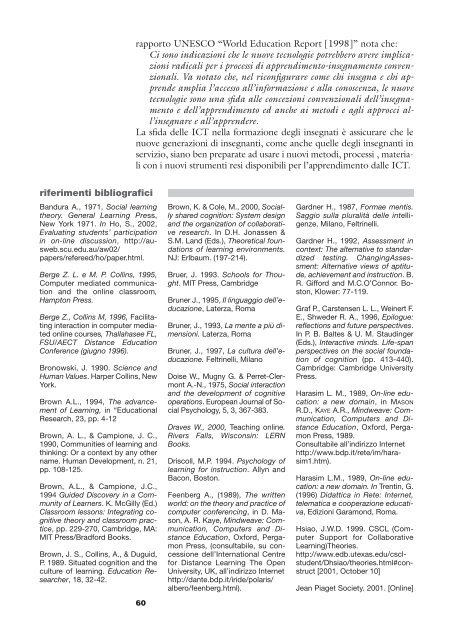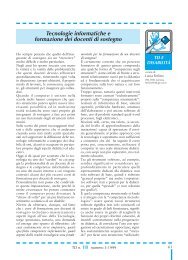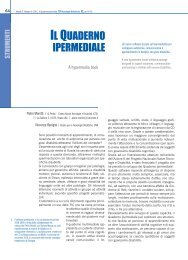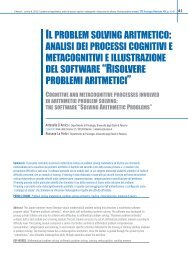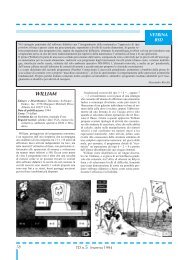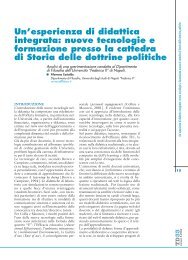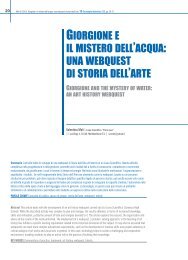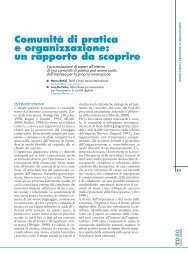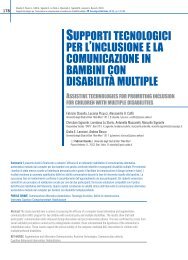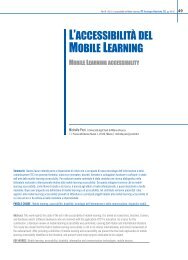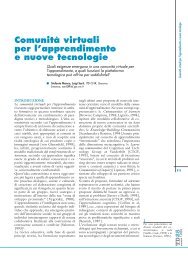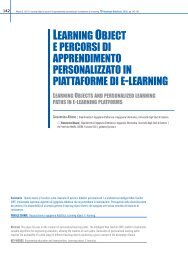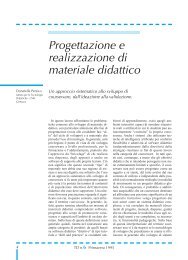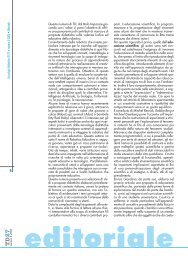Download PDF - Tecnologie Didattiche - Cnr
Download PDF - Tecnologie Didattiche - Cnr
Download PDF - Tecnologie Didattiche - Cnr
You also want an ePaper? Increase the reach of your titles
YUMPU automatically turns print PDFs into web optimized ePapers that Google loves.
iferimenti bibliografici<br />
Bandura A., 1971, Social learning<br />
theory. General Learning Press,<br />
New York 1971. In Ho, S., 2002,<br />
Evaluating students’ participation<br />
in on-line discussion, http://ausweb.scu.edu.au/aw02/<br />
papers/refereed/ho/paper.html.<br />
Berge Z. L. e M. P. Collins, 1995,<br />
Computer mediated communication<br />
and the online classroom,<br />
Hampton Press.<br />
Berge Z., Collins M, 1996, Facilitating<br />
interaction in computer mediated<br />
online courses, Thallahasee FL,<br />
FSU/AECT Distance Education<br />
Conference (giugno 1996).<br />
Bronowski, J. 1990. Science and<br />
Human Values. Harper Collins, New<br />
York.<br />
Brown A.L., 1994, The advancement<br />
of Learning, in “Educational<br />
Research, 23, pp. 4-12<br />
Brown, A. L., & Campione, J. C.,<br />
1990, Communities of learning and<br />
thinking: Or a context by any other<br />
name. Human Development, n. 21,<br />
pp. 108-125.<br />
Brown, A.L., & Campione, J.C.,<br />
1994 Guided Discovery in a Community<br />
of Learners. K. McGilly (Ed.)<br />
Classroom lessons: Integrating cognitive<br />
theory and classroom practice,<br />
pp. 229-270, Cambridge, MA:<br />
MIT Press/Bradford Books.<br />
Brown, J. S., Collins, A., & Duguid,<br />
P. 1989. Situated cognition and the<br />
culture of learning. Education Researcher,<br />
18, 32-42.<br />
rapporto UNESCO “World Education Report [1998]” nota che:<br />
Ci sono indicazioni che le nuove tecnologie potrebbero avere implicazioni<br />
radicali per i processi di apprendimento-insegnamento convenzionali.<br />
Va notato che, nel riconfigurare come chi insegna e chi apprende<br />
amplia l’accesso all’informazione e alla conoscenza, le nuove<br />
tecnologie sono una sfida alle concezioni convenzionali dell’insegnamento<br />
e dell’apprendimento ed anche ai metodi e agli approcci all’insegnare<br />
e all’apprendere.<br />
La sfida delle ICT nella formazione degli insegnati è assicurare che le<br />
nuove generazioni di insegnanti, come anche quelle degli insegnanti in<br />
servizio, siano ben preparate ad usare i nuovi metodi, processi , materiali<br />
con i nuovi strumenti resi disponibili per l’apprendimento dalle ICT.<br />
60<br />
Brown, K. & Cole, M., 2000, Socially<br />
shared cognition: System design<br />
and the organization of collaborative<br />
research. In D.H. Jonassen &<br />
S.M. Land (Eds.), Theoretical foundations<br />
of learning environments.<br />
NJ: Erlbaum. (197-214).<br />
Bruer, J. 1993. Schools for Thought.<br />
MIT Press, Cambridge<br />
Bruner J., 1995, Il linguaggio dell’educazione,<br />
Laterza, Roma<br />
Bruner, J., 1993, La mente a più dimensioni.<br />
Laterza, Roma<br />
Bruner, J., 1997, La cultura dell’educazione.<br />
Feltrinelli, Milano<br />
Doise W., Mugny G. & Perret-Clermont<br />
A.-N., 1975, Social interaction<br />
and the development of cognitive<br />
operations. European Journal of Social<br />
Psychology, 5, 3, 367-383.<br />
Draves W., 2000, Teaching online.<br />
Rivers Falls, Wisconsin: LERN<br />
Books.<br />
Driscoll, M.P. 1994. Psychology of<br />
learning for instruction. Allyn and<br />
Bacon, Boston.<br />
Feenberg A., (1989), The written<br />
world: on the theory and practice of<br />
computer conferencing, in D. Mason,<br />
A. R. Kaye, Mindweave: Communication,<br />
Computers and Distance<br />
Education, Oxford, Pergamon<br />
Press, (consultabile, su concessione<br />
dell’International Centre<br />
for Distance Learning The Open<br />
University, UK, all’indirizzo Internet<br />
http://dante.bdp.it/iride/polaris/<br />
albero/feenberg.html).<br />
Gardner H., 1987, Formae mentis.<br />
Saggio sulla pluralità delle intelligenze,<br />
Milano, Feltrinelli.<br />
Gardner H., 1992, Assessment in<br />
context: The alternative to standardized<br />
testing. ChangingAssessment:<br />
Alternative views of aptitude,<br />
achievement and instruction. B.<br />
R. Gifford and M.C.O’Connor. Boston,<br />
Klower: 77-119.<br />
Graf P., Carstensen L. L., Weinert F.<br />
E., Shweder R. A., 1996, Epilogue:<br />
reflections and future perspectives.<br />
In P. B. Baltes & U. M. Staudinger<br />
(Eds.), Interactive minds. Life-span<br />
perspectives on the social foundation<br />
of cognition (pp. 413-440).<br />
Cambridge: Cambridge University<br />
Press.<br />
Harasim L. M., 1989, On-line education:<br />
a new domain, in MASON<br />
R.D., KAYE A.R., Mindweave: Communication,<br />
Computers and Distance<br />
Education, Oxford, Pergamon<br />
Press, 1989.<br />
Consultabile all’indirizzo Internet<br />
http://www.bdp.it/rete/im/harasim1.htm).<br />
Harasim L.M., 1989, On-line education:<br />
a new domain. In Trentin, G.<br />
(1996) Didattica in Rete: Internet,<br />
telematica e cooperazione educativa,<br />
Edizioni Garamond, Roma.<br />
Hsiao, J.W.D. 1999. CSCL (Computer<br />
Support for Collaborative<br />
Learning)Theories.<br />
http://www.edb.utexas.edu/csclstudent/Dhsiao/theories.html#construct<br />
[2001, October 10]<br />
Jean Piaget Society. 2001. [Online]


